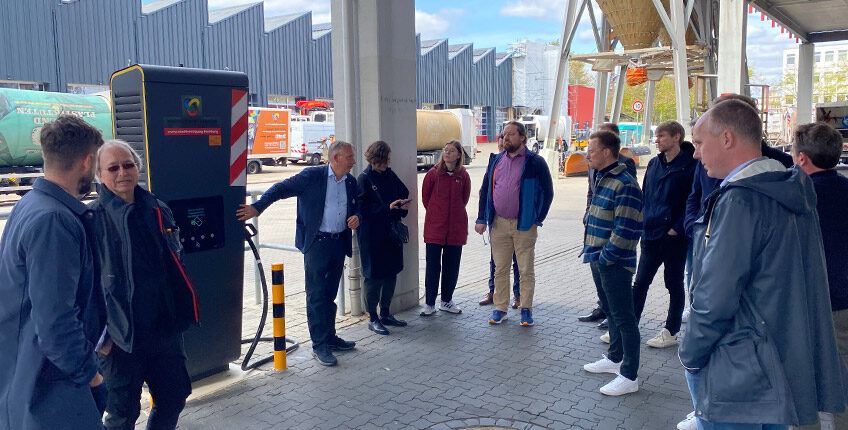The project is conducting research into how logistics companies can charge electric commercial vehicle fleets at their own depots in the future and integrate the charging process into their operating procedures.
Heavy commercial vehicles, such as articulated trucks, waste collection vehicles or sweepers, will in future also be on the road with climate-friendly drives and in this way make their contribution to reducing emissions from the transport sector. However, unlike passenger cars, these vehicles cannot simply head for existing charging points at the roadside when the battery requires recharging. Furthermore, it must be ensured that they are fully operational at certain times. So where should heavy electric commercial vehicles charge in the future? Solutions are being developed by the freshly launched BELLE research and development project.
BELLE stands for “Betriebshofelektrifizierung – Ladeinfrastruktur und Lastmanagement in der praktischen Erprobung” (Electrification of depots – charging infrastructure and load management in practical trials). Here, research is being conducted into how logistics and haulage companies, city cleaning services or other businesses can charge electric commercial vehicle fleets in their own depots in the future and integrate the charging process into their operational procedures. The project partners hySOLUTIONS, ABB E-Mobility, HAW Hamburg, as well as Hamburg’s city cleaning and electric companies Stadtreinigung Hamburg and Stromnetz Hamburg together with the associated application partner Dachser, gave the starting signal for the three-year project at a kick-off event in Hamburg on 3 May 2023.
Electric mobility still has many challenges in heavy goods transport
Although the ramp-up of electric mobility is also gaining strong momentum in the commercial vehicle sector, electric trucks are still nowhere near as widespread as e-cars. While the availability of vehicle models has gained momentum in the intervening time, from a business perspective, there are still three main obstacles that need to be addressed:
- Electric mobility in heavy-duty transport is still relatively expensive. In addition to the higher vehicle costs, there are further costs for the charging infrastructure – the upgrading of the network connection at existing depots is particularly expensive.
- There is often not enough space for charging infrastructure at depots. In places where the vehicles are parked for longer periods of time for operational reasons (e.g., at the loading bay), it is often not possible to install charging points, the charging times are too long and thus prevent the use of the vehicles in multi-shift operation. In addition, the range is not yet sufficient for long-distance transport.
- There is a lack of standards for manufacturers of vehicles, charging infrastructure, as well as battery storage, charging and load management systems. Often the systems are not compatible and there is a lack of effective interfaces between the IT systems on site and the load and charging management.
Modular and scalable charging infrastructure for depots
The BELLE project addresses these problems by developing a depot concept for various use cases in the waste management and logistics sector. A modular and scalable charging infrastructure solution should enable depots to put together a system themselves for their respective area and network conditions at the respective locations.
Specifically, the project is developing charging infrastructure concepts for two different contexts of use and implementing them in the operational processes at depots. Electrotechnical, economic and operational process considerations are taken into account. In this demonstration phase, know-how is gained that can be used in the future for applications in other logistics areas. These will be incorporated into a transferable concept that will ultimately facilitate the integration of electric commercial vehicles in depots.
Funding support from the German government
BELLE will receive funding support amounting to more than one million euros from the Electric Mobility Funding Guideline of the Federal Ministry of Digital and Transport – the funding notification was handed over by Federal Minister Dr. Volker Wissing in person at the BMDV’s Electric Mobility Conference on 21 March 2023. The funding guideline is coordinated by NOW GmbH and implemented by Project Management Jülich (PtJ). BELLE is also part of the implementation of the BMDV’s overall concept for climate-friendly commercial vehicles as a technology and testing project.


